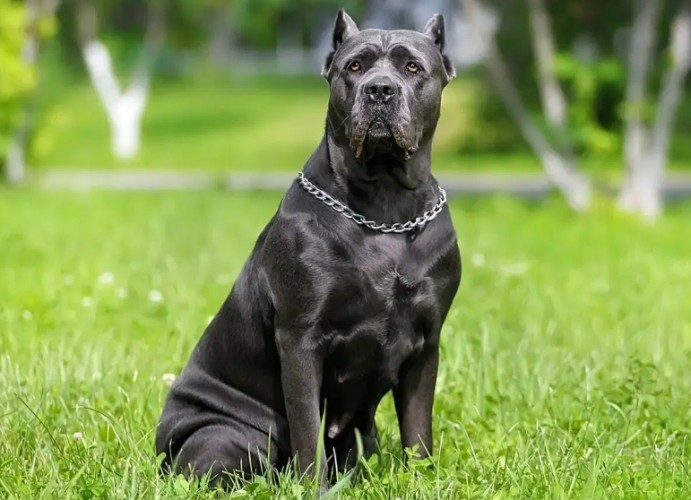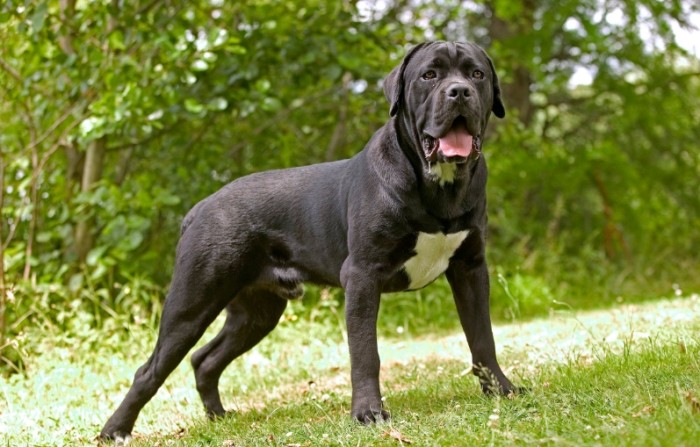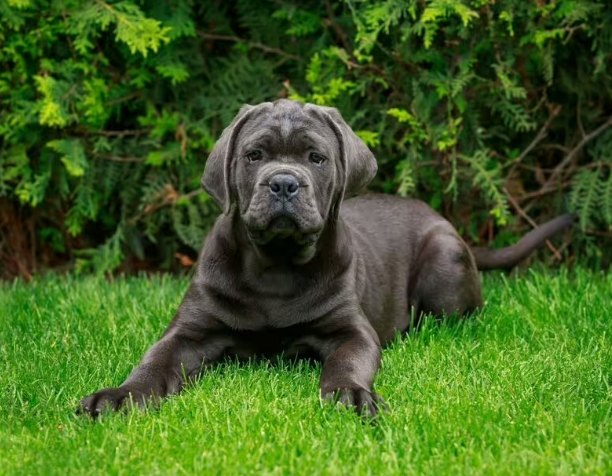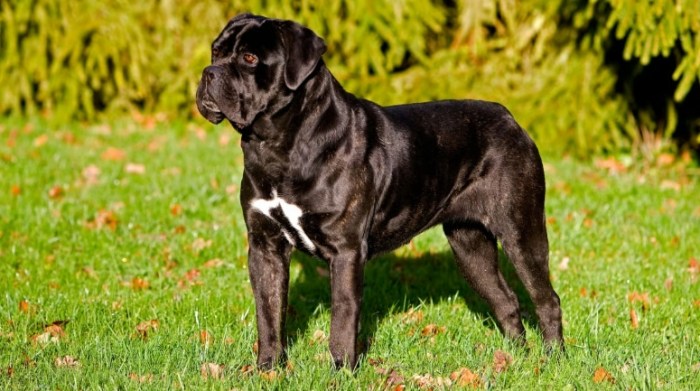Advertisements
Cane Corso Dog: Introduction, Common Diseases, Care Tips, Costs & Suitability for First-Time Owners
Is the Cane Corso Dog the right breed for you? Discover our Introduction to the Cane Corso, including common diseases of the Cane Corso, essential caring for the Cane Corso tips, and the cost of raising a Cane Corso. Find out if this powerful breed is suitable for first-time dog owners!
Table of contents
Hey there, fellow dog lovers! If you’re here, chances are you’ve got your eye on the Cane Corso—a breed that’s as majestic as it is misunderstood. I’ve been a proud Cane Corso parent for years, and I’m stoked to share everything I’ve learned about these incredible dogs. Whether you’re just curious or seriously considering bringing one home, this guide’s got your back. Let’s dive in!
Introduction to the Cane Corso
The Cane Corso (pronounced “KAH-nay KOR-so”) is a breed that’s hard to ignore. With their muscular build, regal stance, and intense gaze, they’re like the bodybuilders of the dog world—but with a heart of gold. Let’s break down what makes them so special.
Appearance and Physical Traits
The Cane Corso is a large to giant breed, with males typically weighing between 99 and 110 pounds and females slightly smaller at 88 to 99 pounds. Their coat is short, dense, and comes in colors like black, fawn, brindle, and gray. But it’s not just their size that’s striking—their head is massive, with a broad skull, deep muzzle, and expressive eyes that seem to see right into your soul. Their ears are often cropped (though this is becoming less common), and their tail is usually docked, giving them a distinctive, almost intimidating look. But don’t let that fool you—underneath that tough exterior lies a loyal, affectionate companion.
Temperament and Personality
One of the things I love most about the Cane Corso is their temperament. They’re not your typical “lap dog,” but they’re incredibly devoted to their families. They’re protective, intelligent, and have a natural instinct to guard. This makes them excellent watchdogs, but it also means they need a firm, consistent hand in training. They’re not the type to cuddle on the couch all day (though they’ll happily join you for a nap), but they thrive on mental and physical stimulation. They’re also known for their patience with children, making them great family dogs—as long as they’re properly socialized.
History and Origins
The Cane Corso has a rich history that dates back to ancient Rome. They were originally bred as working dogs, used for hunting large game, guarding property, and even participating in war. The name “Cane Corso” itself is derived from the Latin “cohors,” meaning “guardian” or “protector.” Over the centuries, the breed evolved, and by the 20th century, they were on the brink of extinction. Thankfully, dedicated breeders in Italy worked to revive the Cane Corso, and today, they’re beloved around the world for their loyalty, strength, and intelligence.
Why the Cane Corso Stands Out
What sets the Cane Corso apart from other large breeds is their combination of power and grace. They’re not just big and strong—they’re also agile and athletic. They excel in activities like obedience, agility, and even dock diving. But more than anything, they’re loyal to a fault. Once a Cane Corso bonds with you, they’ll do anything to protect you. It’s a bond that’s hard to describe but impossible to forget.
Common Misconceptions
Despite their many positive traits, the Cane Corso often gets a bad rap. People assume they’re aggressive, unpredictable, or hard to handle. But the truth is, like any breed, their behavior depends on how they’re raised. A well-socialized, properly trained Cane Corso is a joy to be around. They’re not for everyone, but for the right person, they’re the perfect companion.
Common Diseases of the Cane Corso
Now, let’s talk about the not-so-fun stuff: health. The Cane Corso is generally a robust breed, but like all dogs, they’re prone to certain health issues. Being aware of these can help you keep your furry friend happy and healthy for years to come.
Hip and Elbow Dysplasia
One of the most common issues in large breeds like the Cane Corso is hip and elbow dysplasia. This is a genetic condition where the hip or elbow joint doesn’t develop properly, leading to pain, lameness, and arthritis. It’s important to buy from a reputable breeder who screens their dogs for these conditions. Regular vet check-ups and maintaining a healthy weight can also help reduce the risk.
Heart Conditions
The Cane Corso is also prone to certain heart conditions, like dilated cardiomyopathy (DCM). This is a disease where the heart becomes enlarged and can’t pump blood effectively. Symptoms can include coughing, fatigue, and fainting. Regular vet visits and listening to your dog’s heart can help catch this early. Some vets recommend annual echocardiograms for high-risk breeds.
Eye Problems
Eye issues are another concern for the Cane Corso. Conditions like entropion (where the eyelid rolls inward, causing irritation) and ectropion (where the eyelid rolls outward) are common. They can also be prone to cherry eye, a condition where the gland in the third eyelid protrudes. Regular eye exams and keeping an eye out for signs of discomfort (like rubbing or squinting) are key.
Skin and Allergies
The Cane Corso has a short coat, but that doesn’t mean they’re immune to skin issues. They can be prone to allergies, which can cause itching, redness, and hot spots. Food allergies, environmental allergens (like pollen or dust mites), and even flea bites can trigger reactions. If you notice your dog scratching excessively, talk to your vet about allergy testing and treatment options.
Bloat (Gastric Dilatation-Volvulus)
Bloat is a life-threatening condition that can affect any deep-chested breed, including the Cane Corso. It happens when the stomach fills with gas and twists, cutting off blood flow. Symptoms include restlessness, drooling, a distended abdomen, and unsuccessful attempts to vomit. If you suspect bloat, get your dog to the vet immediately. Feeding smaller, more frequent meals and avoiding exercise right after eating can help reduce the risk.
Caring for the Cane Corso
Okay, so you’re still here? Awesome! That means you’re serious about the Cane Corso. Now, let’s talk about how to care for one. From training to grooming, here’s everything you need to know.
Training and Socialization
Training is non-negotiable with the Cane Corso. They’re intelligent, but they’re also strong-willed. Early socialization is crucial to ensure they grow up to be well-adjusted adults. Expose them to different people, animals, and environments from a young age. Positive reinforcement training works best—think treats, praise, and play. Avoid harsh methods, as they can backfire with this sensitive breed.
Exercise and Mental Stimulation
The Cane Corso is an active breed that needs plenty of exercise. Daily walks, playtime in the yard, and even activities like hiking or agility training are great. But don’t forget about mental stimulation! Puzzle toys, obedience training, and interactive games can keep their sharp minds engaged. A bored Cane Corso is a destructive Cane Corso, so keep them busy!
Grooming and Coat Care
Despite their short coat, the Cane Corso isn’t completely low-maintenance. They shed moderately year-round and more heavily during seasonal changes. Weekly brushing with a rubber grooming mitt can help remove loose hair and keep their coat shiny. Baths should be given as needed, but not too frequently, as it can dry out their skin. Don’t forget to check their ears regularly for wax buildup and trim their nails every few weeks.
Diet and Nutrition
Feeding your Cane Corso a high-quality diet is essential. They’re prone to obesity, so portion control is key. Look for a dog food that’s high in protein and low in fillers. Some owners opt for raw or homemade diets, but it’s important to consult with a vet or canine nutritionist to ensure your dog gets all the nutrients they need. Treats should be given in moderation, especially if your dog is prone to weight gain.
Health Monitoring and Vet Visits
Regular vet check-ups are a must for the Cane Corso. They should see the vet at least once a year for a physical exam, vaccinations, and parasite prevention. As they age, more frequent visits may be needed to monitor for health issues like arthritis or heart disease. Keep an eye out for changes in behavior, appetite, or energy levels, as these can be signs of underlying problems.

Cost of Raising a Cane Corso
Alright, let’s talk money. The Cane Corso isn’t a cheap breed to own, but the love and loyalty they offer are priceless. Here’s a breakdown of the costs you can expect.
Purchase Cost
The price of a Cane Corso puppy can vary widely, depending on factors like bloodline, breeder reputation, and location. On average, you can expect to pay anywhere from $1,500 to $4,000 for a well-bred puppy. Show-quality dogs or those from champion bloodlines can cost even more. Remember, this is a long-term investment, so don’t skimp on quality.
Initial Setup Costs
When you bring your Cane Corso home, you’ll need to stock up on supplies. This includes a crate, bed, food and water bowls, leash and collar, toys, and grooming tools. You’ll also need to budget for things like a vet visit for vaccinations and a microchip. Initial setup costs can range from $500 to $1,000, depending on the quality of the items you choose.
Ongoing Expenses
The Cane Corso isn’t just a one-time purchase—they’re a lifelong commitment. Ongoing expenses include food, treats, vet bills, grooming, and pet insurance. Food costs can add up, especially if you’re feeding a high-quality diet. Vet bills can vary, but you should budget for annual check-ups, vaccinations, and parasite prevention. Pet insurance can help offset unexpected costs, but it’s an additional monthly expense.
Training and Behavioral Costs
If you’re new to the Cane Corso or large breeds in general, you might want to invest in professional training. Group classes or private lessons can cost anywhere from $100 to $300 per session. Behavioral consultations or specialized training (like for aggression or anxiety) can be even more expensive. But trust me, it’s worth it to ensure your dog is well-behaved and happy.
Long-Term Financial Planning
The Cane Corso has an average lifespan of 10 to 12 years, so you’ll need to plan for the long term. This includes setting aside money for emergencies, like unexpected surgeries or illnesses. It’s also a good idea to start a savings account for your dog’s future needs. Remember, owning a Cane Corso is a financial commitment, but the love and companionship they offer are worth every penny.
Is the Cane Corso Suitable for First-Time Dog Owners?
This is a big question, and one that deserves a thorough answer. The Cane Corso is an amazing breed, but they’re not for everyone—especially first-time dog owners. Here’s why.
Training and Handling Challenges
The Cane Corso is intelligent, but they’re also strong-willed. They need a firm, consistent hand in training. If you’re not experienced with dog training, you might find yourself overwhelmed. They’re not the type to respond well to permissive or inconsistent training methods. You’ll need to be patient, persistent, and willing to put in the time and effort to train them properly.
Socialization Needs
Socialization is crucial for the Cane Corso, but it’s not always easy. They’re naturally protective and can be wary of strangers. Early, positive socialization experiences are essential to ensure they grow up to be well-adjusted adults. This means exposing them to different people, animals, and environments from a young age. If you’re not comfortable or experienced with socializing a dog, the Cane Corso might not be the best fit.
Exercise and Mental Stimulation Requirements
The Cane Corso is an active breed that needs plenty of exercise and mental stimulation. If you’re not prepared to provide daily walks, playtime, and interactive activities, they can become bored and destructive. They’re not the type to be happy lounging around the house all day. You’ll need to be committed to keeping them physically and mentally engaged.
Health and Financial Considerations
As we’ve discussed, the Cane Corso is prone to certain health issues, and they’re not a cheap breed to own. You’ll need to be prepared for the financial commitment of owning a large breed, including vet bills, food, and supplies. If you’re not in a position to handle these costs, the Cane Corso might not be the right choice for you.
Alternative Breeds for First-Time Owners
If you’re a first-time dog owner but still drawn to the Cane Corso, don’t despair! There are plenty of other breeds that might be a better fit. Breeds like the Golden Retriever, Labrador Retriever, or Beagle are known for their friendly, easygoing nature and are often recommended for first-time owners. Do your research, talk to breeders and owners, and find a breed that matches your lifestyle and experience level.
Q&A: Common Questions About the Cane Corso
Let’s wrap things up with some frequently asked questions about the Cane Corso. If you’ve got more questions, feel free to reach out—I’m always happy to chat!
Are Cane Corso on the aggressive breed list?
The Cane Corso is often labeled as an “aggressive” breed, but this is a misconception. Like any breed, their behavior depends on how they’re raised. A well-socialized, properly trained Cane Corso is not inherently aggressive. They’re protective by nature, but with the right owner, they can be loving, loyal companions.
Are Cane Corso aggressive to other dogs?
The Cane Corso can be dog-selective, meaning they might not get along with every dog they meet. Early socialization is key to ensuring they can coexist peacefully with other pets. If you have other dogs or plan to introduce your Cane Corso to other animals, it’s important to do so gradually and under supervision.
Is a Cane Corso like a pitbull?
While the Cane Corso and pitbulls share some similarities in appearance and temperament, they’re actually quite different breeds. The Cane Corso is a Mastiff-type breed, while pitbulls are part of the Terrier group. They have different histories, physical traits, and temperaments. Both can be great dogs, but they’re not interchangeable.
Why are Cane Corso dogs so expensive?
The Cane Corso is a relatively rare breed, especially compared to more popular breeds like Labs or Golden Retrievers. Reputable breeders invest a lot of time, money, and effort into breeding healthy, well-socialized puppies. They also screen their dogs for genetic health issues, which adds to the cost. Additionally, the demand for Cane Corso puppies often exceeds supply, driving up prices.
Phew, we’ve covered a lot of ground! The Cane Corso is an amazing breed, but they’re not for everyone. They’re loyal, protective, and intelligent, but they also require a lot of time, effort, and commitment. If you’re up for the challenge, though, they’ll reward you with years of love and companionship.
Remember, owning a Cane Corso is a long-term decision. Do your research, talk to breeders and owners, and make sure you’re prepared for the responsibilities that come with this incredible breed. And if you do decide to bring one home, get ready for a journey filled with laughter, love, and maybe a little bit of chaos (in the best way possible).
Leave a Message